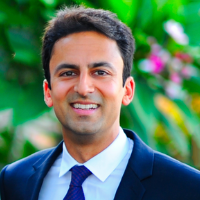This blog post was co-authored by Legalpad – Legalpad immigration experts help student entrepreneurs just like you move closer to work visa and permanent residency goals quickly and efficiently.
International student entrepreneurs who have just launched a startup or plan to do so may struggle to obtain the required work authorization to stay in the U.S. after graduation. Use this guide to help you navigate U.S. visa options so that you can legally remain in the country while growing your business.
There are several steps student founders can take to launch their company in the U.S. prior to obtaining work authorization. This includes setting up your business entity such as an LLC, securing investors and clients, and acquiring a workspace. A startup founder who is still in college only needs work authorization once the business is operational and they are actively working and earning a salary.
Starting a Business While in College vs After Graduation
International students on an F-1 visa can use Curricular Practice Training (CPT) or Optional Practical Training (OPT) to start their business in the U.S. Both allow student founders to work in the business for up to one year while they are still in school. It is important to note that OPT can also be used after graduation while CPT cannot.
When starting a business on OPT, you must:
- Ensure the business has any legally required licenses
- Engage in work that is related to your degree program
For STEM students starting a STEM-related business, OPT can be extended another two years post-graduation. If you are a startup founder on a STEM OPT extension, you must also work full-time for the business and register your company on E-verify.gov.
After OPT/STEM OPT expires, students have just 60 days to find alternative work authorizations or they will be forced to leave the country. For international students to continue working in the U.S. at the company they founded, a new work visa is necessary.
6 U.S. Work Visa Options for Founders
A startup founder whose OPT or CPT degree program is ending can apply for a temporary (nonimmigrant) visa like an O-1A, H-1B, E-2, or TN. They can also apply for a permanent resident visa, known as a green card, such as the EB-2 NIW or EB-1A. Let’s explore each of these options more closely.
O-1A Visa
The O-1A work visa is a temporary visa for individuals with extraordinary abilities, and it’s one of the best options for startup founders. To qualify for an O-1A visa, you must meet three of these eight criteria.
What makes the O-1A so appealing?
- It is valid for three years and can be extended indefinitely.
- There is no minimum income requirement.
- There is no specific degree requirement.
H-1B Visa
The H-1B visa is the most common nonimmigrant work visa. It lasts six years with the possibility to extend and apply for permanent residency. However, the H-1B visa has a wage requirement for employees depending on their position.
If you are working as a C-level executive at your company, such as a CEO, CTO, or COO, the high wage requirement may be difficult to meet as an early-stage, student founder. Regardless of the company size or stage, you must pay yourself the prevailing wage required for all C-suite roles – no exceptions. An H-1B also requires the visa holder to have an employer who can supervise them. For business owners, this supervisory entity could be a co-founder or board of directors.
E-2 Visa
The E-2 visa is specifically for investors from certain treaty countries. Business founders qualify if they invested a significant amount of seed money into the company. While the USCIS does not specify how much qualifies as a significant amount, the general guidance is that the investment should be proportional to the business.
Important details to know about the E-2 investor visa:
- The investor must own at least 50% of the company.
- The visa can be extended indefinitely as long as the business is viable.
TN Visa
If you are a startup founder from Canada or Mexico, it’s worth looking into the TN visa. To qualify, you must work for your business in a specific role. This option includes the possibility to renew the visa indefinitely, and there is no limit on the number of visas offered each year.
EB-2 NIW
The EB-2 National Interest Waiver (NIW) is a permanent immigrant petition. This differs from the other visas discussed so far because it does not give you work authorization. If your STEM OPT expires, getting an approved EB-2 NIW would not immediately help you stay in the U.S. Once your EB-2 NIW is approved, you will have to wait until your green card is processed before you can use it to legally work in the U.S. This can take up to a year, so consider applying at least 12 months before graduation or before your OPT expires.
To qualify, you must either have an advanced degree or exceptional ability. As a startup founder, you must prove that your company has strong potential to be successful and make a positive impact in the U.S. in the future. This could be an economic impact such as creating more jobs or a social impact such as providing a public service.
International students from China and India may want to pursue the EB-1A visa over the EB-2 NIW visa. This is because the EB-2 NIW processing time for individuals from these countries is much longer than the processing time for the EB-1A visa.
EB-1A
The EB-1A visa is another permanent immigration option for individuals with extraordinary abilities. The criteria are almost identical to those for the O-1 visa, but the standard for acceptance is higher with the EB-1A. This is the most difficult immigrant visa to acquire because you must prove that you are in the top 1% of your field. However, the EB-1A visa is ideal for qualifying international students from China and India. The EB-1A offers shorter wait times for individuals from these countries than the more popular EB-2 NIW visa.
Like the EB-2 NIW, the EB-1A does not immediately grant applicants work authorization once the petition is approved. EB-1A approval starts the green card process, and startup founders will need alternative work authorization until their green card is fully processed.
Tips for Success as an International Student Founder
Don’t wait until graduation to begin preparing your work visa application, as it may take time to meet the requirements for certain visas. Even if you are not ready to launch your startup, begin researching entrepreneur visa options while you are still in school. During college and OPT, you can strengthen your portfolio to increase your chances of being accepted for an O-1, E-1A, or EB-2 NIW visa. There are many actions you can take to meet the extraordinary ability requirements for these visas, some of which include:
- Published Material: Try to get featured in the press during school by networking with journalists on LinkedIn and pitching your story to news outlets like TechCrunch and Forbes.
- Awards: Join industry-relevant competitions that are nationally or internationally recognized. Alternatively, VC funding can count as a qualifying award for entrepreneurs.
- Membership: Join an outstanding and reputable professional organization. There are general associations for founders and ones catered to specific industries such as the American Society of Mechanical Engineers. An accelerator or incubator can also count as an eligible membership.
- Judging: If you were part of an accelerator or incubator, be proactive and reach out to sit on judging panels for business events such as a hackathon.
International students may be tempted to discount the O-1A and EB-1A visas assuming they don’t meet the strict extraordinary ability requirements, but preparing early and building your eligibility while in college can expand your visa options.
Choosing the Best Immigration Path Post-OPT
The best immigration path for you depends on multiple factors such as the type of company you have, how much funding the business has received, and what country you are from. Legalpad immigration experts help student entrepreneurs just like you move closer to work visa and permanent residency goals quickly and efficiently. They simplify the stressful and annoying complexities of U.S. immigration for international students who start their own businesses before or after graduation. Reach out to Legalpad today for a free one-on-one consultation.
























